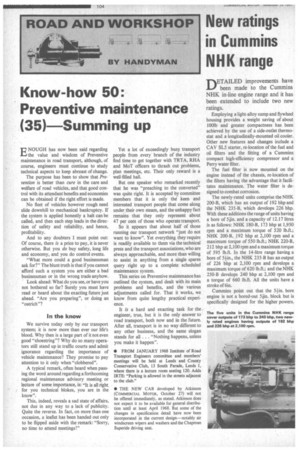Know-how 50: Preventive maintenance (35) Summing up
Page 106

If you've noticed an error in this article please click here to report it so we can fix it.
ENOUGH has now been said regarding the value and wisdom of Preventive maintenance in road transport, although, of course, engineers must continue to study technical aspects to keep abreast of change.
The purpose has been to show that Prevention is better than cure in the care and welfare of road vehicles, and that good control with its attendant benefits and economies can be obtained if the right effort is made.
No fleet of vehicles however rough need slide downhill to mechanical bankruptcy. If the system is applied honestly a halt can be called, and then each step leads in the direction of safety and reliability, and hence, profitability.
And to any doubters I must point out: Of course, there is a price to pay, it is never otherwise. But you do buy safety, long life and economy, and you do control events.
"What more could a good businessman ask for?" The blunt truth is that if you cannot afford such a system you are either a bad businessman or in the wrong trade anyhow.
Look ahead: What do you see, or have you not bothered so far? Surely you must have read or heard about the exacting future just ahead. "Are you preparing", or doing an "ostrich"?
In the know We survive today only by our transport system; it is now more than ever our life's blood. Why then is a large part of it not even good "shoestring"? Why do so many operators still stand up in traffic courts and admit ignorance regarding the importance of vehicle maintenance? They promise to pay attention to it only when "clobbered".
A typical remark, often heard when passing the word around regarding a forthcoming regional maintenance advisory meeting or lecture of some importance, is: "It is all right for you technical blokes, you are in the know".
This, indeed, reveals a sad state of affairs, not due in any way to a lack of publicity. Quite the reverse. In fact, on more than one occasion, a leaflet has been handed out only to be flipped aside with the remark: "Sorry, no time to attend meetings !" Yet a lot of exceedingly busy transport people from every branch of the industry find time to get together with TRTA, RHA and MoT officers to thrash out problems, plan meetings, etc. Their only reward is a well-filled hall.
But one speaker who remarked recently that he was "preaching to the converted" was quite right. It is accepted by committee members that it is only the keen and interested transport people that come along under their own steam, and the unhappy fact remains that they only represent about 47 per cent of those who operate transport.
So it appears that about half of those running our transport network "just do not want to know". Yet everything they require is readily available to them via the technical press and the transport associations, who are always approachable, and more than willing to assist in anything from a single spares query right up to a complete scheduled maintenance system.
This series on Preventive maintenance has outlined the system, and dealt with its main problems and benefits, and the various adjustments called for. That it works, we know from quite lengthy practical experience.
It is a hard and exacting task for the engineer, true, but it is the only answer to road transport, both now and in the future. After all, transport is in no way different to any other business, and the same slogan stands for all . . . "Nothing happens, unless you make it happen".
• FROM JANUARY 1968 Institute of Road Transport Engineers committee and members' meetings will be held at Leeds and County Conservative Club, 13 South Parade, Leeds 1, where there is a lecture room seating 120. Adds IRTE: "Parking is allowed in the streets adjacent to the club."
• THE NEW CAB developed by Atkinson (COMMERCIAL MOTOR, October 27) will not be offered immediately, as stated. Atkinson does not expect it to be available for general distribution until at least April 1968. But some of the changes in specification detail have now been incorporated in the current design—notably air windscreen wipers and washers and the Chapman Superide driving seat.




































































































































































































































































